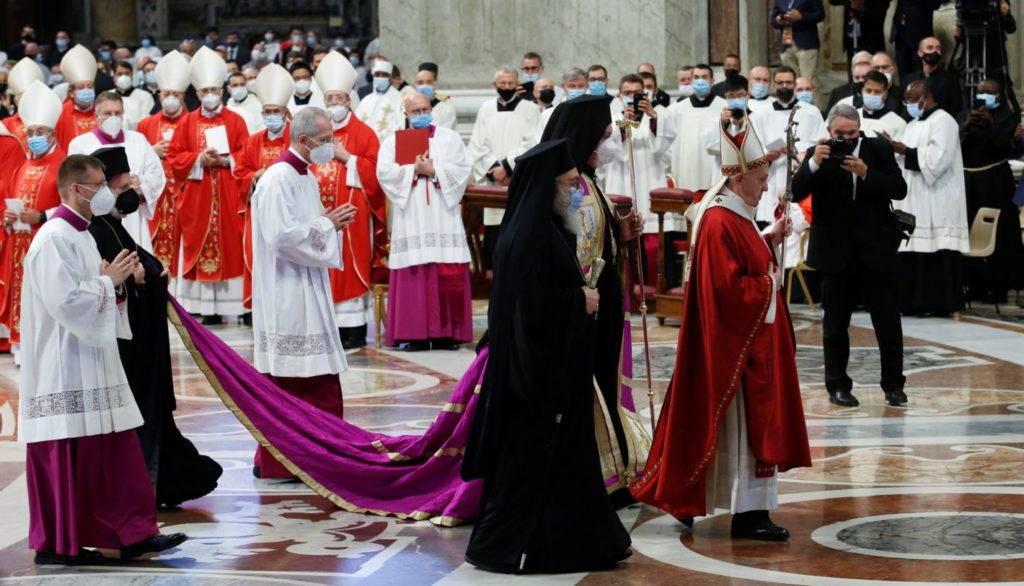 The ecumenical congress in Germany (Kirchentag), the Eucharist and the Holy Spirit
The ecumenical congress in Germany (Kirchentag), the Eucharist and the Holy Spirit Europe celebrates twenty years of ecumenism
Europe celebrates twenty years of ecumenismThe word "communion" was heard at least a dozen times in two separate ecumenical meetings Pope Francis has held in recent weeks with members of other Christian Churches.
On the first occasion he received in audience representatives of the Lutheran World Federation, accompanied by President Musa and Secretary Junge, who came to Rome on the day of the commemoration of the Confessio Augustana - the basic text of the Protestant Churches throughout the world - whose 500th anniversary falls on June 25, 2030.
The purpose of the visit, as Pope Francis recalled in his address, was fundamentally the attempt to make "unity among us" grow. And here the Pontiff offered as food for thought the common adherence to a journey that "from conflict" passes "to communion". A journey that is only possible if one is indeed "in crisis": "the crisis that helps us to mature what we seek".
In fact, already in 1980, Lutherans and Catholics had a joint document - "All under one Christ" - in which they reported: "What we have recognized in the Confessio Augustana as a common faith can help us to confess this faith together in a new way also in our time.
Thirty years have passed, and steps forward have certainly been made. Such as those made by the Council of Nicaea, whose 1700th anniversary will be in 2025, whose "Creed" is a binding text of faith not only for Catholics and Lutherans, but also for Orthodox and many other Christian communities. Pope Francis' hope is that this could be a new occasion for a "new impetus to the ecumenical journey." After all - the Pope explained in his speech - it is not a matter of making a simple "exercise of ecclesial diplomacy, but a path of grace," "which purifies the memory and the heart, overcomes rigidities and orients towards a renewed communion." The goal is to achieve, in short, a "reconciled unity in differences".
Among the next stages of the ecumenical journey with the Lutherans, the Pontiff recalled, will be "the understanding of the close ties between the Church, the ministry and the Eucharist", another test - and one of trust - to be lived with spiritual and theological humility, in order to try to reread "the sad events of the past" "within a reconciled history".
The second occasion of the meeting took place on the Solemnity of the Holy Apostles Peter and Paul, with the Delegation of the Ecumenical Patriarchate of Constantinople, which traditionally travels to Rome for this occasion. At this point, Pope Francis drew inspiration from the health crisis that the world continues to experience; he recalled his concern at seeing this new critical opportunity "wasted" "without learning the lesson it teaches us"; and he asked what "all this" asks of every Christian.
Here too, the answer is to "take up the challenge", to "carry out discernment", to "stop and examine what, of all that we do, remains and what passes away". And in the case of Christians, this means to push hard on the "path towards full communion", overcoming the withdrawal into oneself, the securities and opportunities, the prejudices and rivalries.
"Without ignoring the differences that must be overcome through dialogue, in charity and in truth," Pope Francis therefore reiterated the need to "inaugurate a new phase of relations between our Churches" feeling co-responsible for one another.
All this, moreover, because "the witness of the growing communion among us Christians" will bring hope and encouragement to many, in addition to "promoting a more universal fraternity and reconciliation, capable of correcting the errors of the past".
The common goal, ultimately, must be a peaceful future for all.











